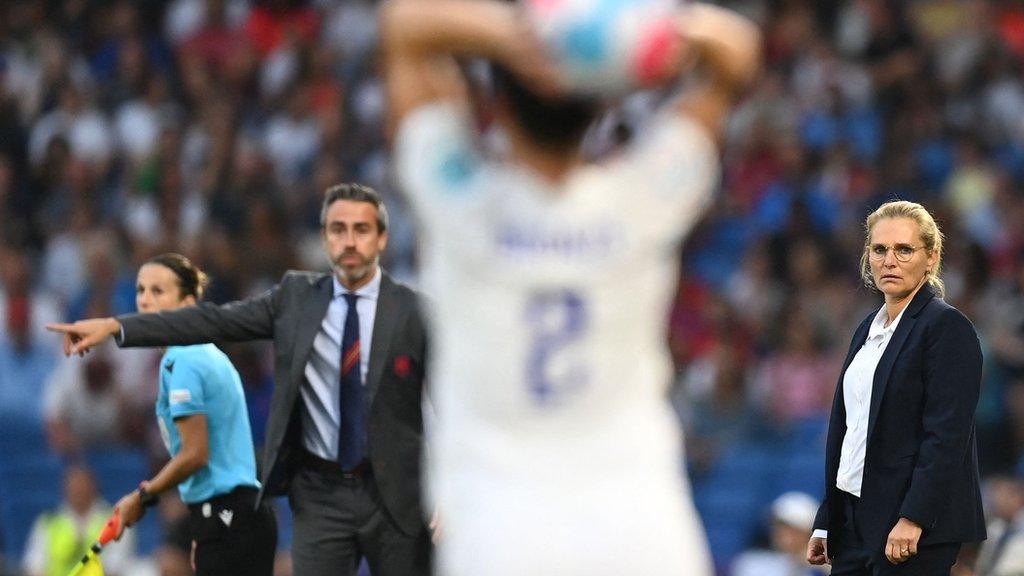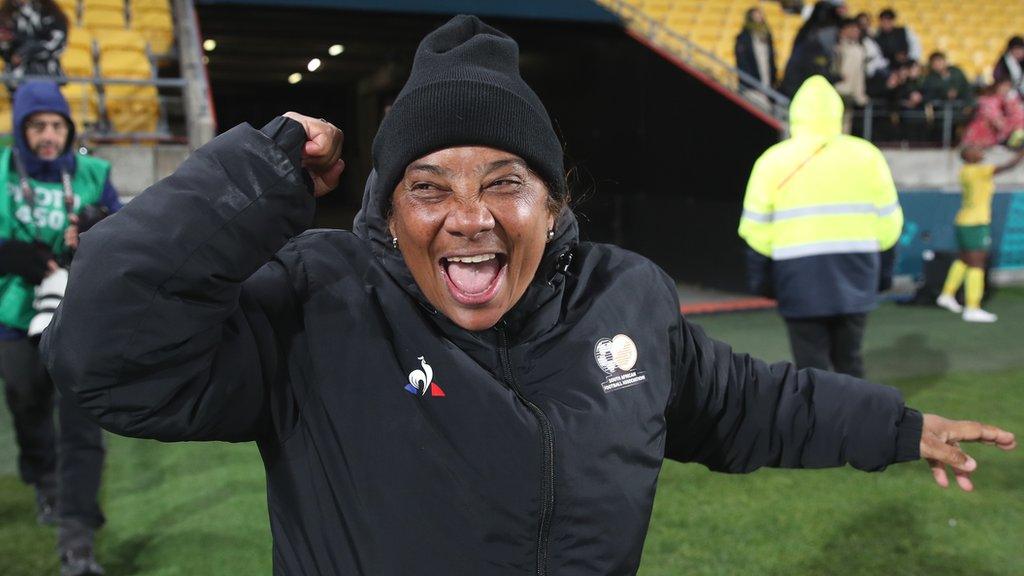Women's World Cup 2023: England coach Sarina Wiegman raising hopes of all women, says Ellis
- Published

After being obsessed with football from a young age, Desiree Ellis played in South Africa's first women's international in 1993 (scoring a hat-trick). Three decades on, she has guided Banyana Banyana to a first Women's Africa Cup of Nations title and to the Women's World Cup second round for the first time.
I'm really looking forward to Sunday's Women's World Cup final and, as another female coach, I'm supporting England and their coach Sarina Wiegman.
That is because she is raising the hopes of all women out there.
There were 12 female coaches for the 32 teams at this World Cup and I was delighted to be one of the three who managed to reach the knockout stage, even if both Hege Riise's Norway and my South Africa side went out in the last 16.
I think what Sarina has done is incredible - to get two European Championship titles, with the Netherlands (in 2017) and England (in 2022), and to two Women's World Cup finals is just absolutely amazing.
This is the big one, of course - wanting to win the World Cup, especially after having come so close in 2019 when her Dutch side were beaten by the United States.
Whatever happens on Sunday, she has already achieved so much. And for us women, she has shown that if given the opportunity and support we can do really well, so I'm definitely supporting her.
Given she has been involved in so many finals now, I think Sarina may well be the calmer of the two coaches, especially since this is Spain's first final. Hopefully the emotions will not get to their coach, Jorge Vilda, but he is very experienced and, with the team having got so far, they will be up for it.
Women's World Cup: England's road to the final in Australia
Where the final will be won and lost
The way that both Sarina and Jorge set up on Sunday will be key.
In the semi-final, I thought Sweden were very open against Spain and did not play their usual game, thinking they could go head-to-head - but Sarina is much smarter than that. She will be tactically aware that Spain might have a lot of the ball.
Likewise, Jorge will know that he will be up against a solid team and that England up front can hurt his side.
So they will both be very wary and I think how both use their bench could be key.

Spain coach Jorge Vilda and England's Sarina Wiegman went head-to-head at the 2022 European Championship, with England edging through 2-1 after extra time in their quarter-final
Both coaches also have big decisions to make regarding whether they field some big-name players in the final.
After Lauren James' red card against Nigeria ruled her out of both the quarter-final and semi-final, Sarina changed her system and this worked really well.
It is impossible to say whether she will recall James as you never know what coaches think - but she might well stick with her last selection, saying "you don't change a winning team".
Jorge, meanwhile, might start again with Ballon d'Or Feminin winner Alexia Putellas, given the experience she brings to the team, having returned for a first start of the tournament in the semi-final after her knee injury.
I think getting these decisions right is going to be crucial for both coaches in regards to how they approach the game.
Desiree Ellis played in South Africa's first ever women's international match 30 years ago when the country was under apartheid rule
Promising future
This Women's World Cup has been terrific to be part of and with Morocco, Nigeria and ourselves all getting to the knockout stage, this has shown how the game has grown on the continent.
But I think if Africa wants to benefit from this, more still needs to be done.

Ellis guided South Africa into the knockout phase for the first time at this year's Women's World Cup
We need to have more competitions. I think the Confederation of African Football has done fantastically in creating an African Women's Champions League, but there are still not enough competitions on the continent for national teams and this must improve.
I also think financial support needs to be better, with member associations needing to give more of their resources to women's football - not just the men's game. We see a lot of countries withdrawing from competitions for financial reasons and that is really sad.
What is most important though is that the game on the continent needs to be professionalised, because if we want to compete with the rest of the world, and knowing how good they are, that is the only way we will be able to do that.
Desiree Ellis was speaking to BBC Sport Africa's Celestine Karoney.